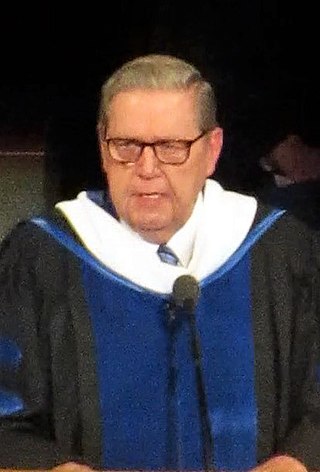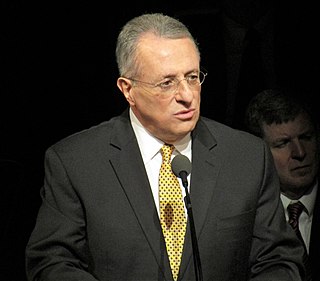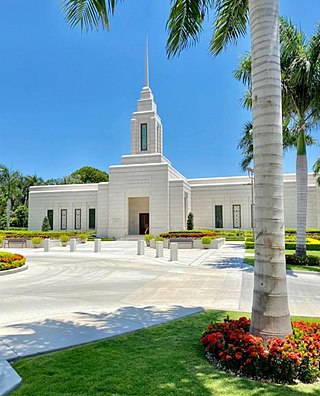Related Research Articles

Jeffrey Roy Holland is an American educator and religious leader. He served as the ninth President of Brigham Young University (BYU) and is a member of the Quorum of the Twelve Apostles of the Church of Jesus Christ of Latter-day Saints. As a member of the Quorum of the Twelve, Holland is accepted by the church as a prophet, seer, and revelator. Currently, he is the fourth most senior apostle in the church.

Alvin Rulon Dyer was an apostle in the Church of Jesus Christ of Latter-day Saints and served as a member of the church's First Presidency from 1968 to 1970.

The Aba Nigeria Temple is the 121st operating temple of the Church of Jesus Christ of Latter-day Saints.
Yoshihiko Kikuchi has been a general authority of the Church of Jesus Christ of Latter-day Saints since 1977, and was the first native Asian to be called as a general authority of the Church.
Glenn Leroy Pace was a general authority of the Church of Jesus Christ of Latter-day Saints from 1985 until his death. As a general authority, he served as a counselor in the presiding bishopric and also in the First Quorum of Seventy. In 2010, he was designated an emeritus general authority.
Teddy Eugene Brewerton was a Canadian-born American general authority of the Church of Jesus Christ of Latter-day Saints from 1978 until his death.

The Church of Jesus Christ of Latter-day Saints in Arkansas refers to the Church of Jesus Christ of Latter-day Saints and its members in Arkansas. The first branch in Arkansas was organized in 1890. It has since grown to 35,405 members in 73 congregations.
Octaviano Tenorio Domínguez has been a general authority of the Church of Jesus Christ of Latter-day Saints since 2007. He was one of the original area authorities called in 1995.
Helio da Rocha Camargo was the first Brazilian general authority of the Church of Jesus Christ of Latter-day Saints. He was called to the First Quorum of the Seventy in 1985 and served there for four years. In 1989, he was transferred, along with other limited-term members of the First Quorum of the Seventy to the newly created Second Quorum of the Seventy. Camargo was released as a general authority in 1990.

Ulisses Soares is a Brazilian religious leader and former businessman who serves as a member of the Quorum of the Twelve Apostles of the Church of Jesus Christ of Latter-day Saints. He has been a general authority since 2005 and served as a member of the church's Presidency of the Seventy from January 2013 until his calling to the Quorum of the Twelve in March 2018. He is the LDS Church's first apostle from South America. As a member of the Quorum of the Twelve, Soares is accepted by the LDS Church as a prophet, seer, and revelator. Currently, he is the junior and fifteenth most senior apostle in the church.
Joseph Wafula Sitati has been a general authority of the Church of Jesus Christ of Latter-day Saints since 2009, when he became a member of the First Quorum of the Seventy. He is the church's first black African general authority and the second general authority of black African descent.
Per Gösta Malm was a general authority of the Church of Jesus Christ of Latter-day Saints from 2010 until his death. Malm was the first general authority who was a resident of Sweden at the time of his call.
Stephen Brown Allen is a maker of Latter-day Saint religious and proselytizing films.

Since Mormonism’s foundation, Black people have been members, however the church placed restrictions on proselytization efforts among black people. Before 1978, black membership was small. It has since grown, and in 1997, there were approximately 500,000 black members of the church, mostly in Africa, Brazil and the Caribbean. Black membership has continued to grow substantially, especially in West Africa, where two temples have been built. By 2018, an estimated 6% of members were black worldwide. In the United States, approximately 1% of members are black.
Don Ray Clarke has been a general authority of the Church of Jesus Christ of Latter-day Saints since 2006.

The Church of Jesus Christ of Latter-day Saints in Nigeria refers to the Church of Jesus Christ of Latter-day Saints and its members in Nigeria. At year-end 1983, there were 2,255 members in Nigeria. In 2022, there were 221,172 members in 769 congregations making it the largest body of LDS Church members in Africa.
Edward Dube has been a general authority of the Church of Jesus Christ of Latter-day Saints since April 2013. He is the first Zimbabwean and the second black African to be a general authority.
Taniela Biu Wakolo has been a general authority of the Church of Jesus Christ of Latter-day Saints since April 2017. He is the first Fijian to serve as a general authority.

The Church of Jesus Christ of Latter-day Saints in Haiti refers to the Church of Jesus Christ of Latter-day Saints and its members in Haiti. The first branch was formed in 1980. As of December 31, 2022, there were 25,525 members in 50 congregations in Haiti.

The Church of Jesus Christ of Latter-day Saints in Mozambique refers to the Church of Jesus Christ of Latter-day Saints and its members in Mozambique.
References
- David William Eka, "Growing with the Church", in E. Dale LeBaron (ed.) (1990). "All are Alike unto God": Fascinating conversion stories of African Saints (Salt Lake City, Utah: Bookcraft) pp. 55–64.
- Alexander B. Morrison (1990). The Dawning of a Brighter Day: The Church in Black Africa (Salt Lake City, Utah: Deseret Book) pp. 90–91.